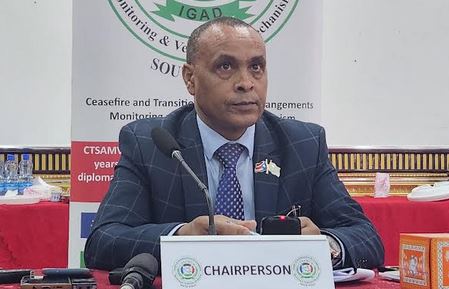The Ceasefire Transitional Security Arrangement Monitoring and Verification Mechanism (CTSAMVM) on Tuesday expressed concerns over the uncertain future funding of the ceasefire monitoring body’s operations.
Speaking during the 47th CTSAMVM Board Meeting at the Beijing Hotel in Juba, the Mechanism’s Chairperson, Maj. Gen. Yitayal Gelaw Bitew said the recent two-year extension of the transitional period of the 2018 revitalized peace agreement has momentous repercussions on the funding of the body.
“It is important to note that this extension has significant implications for the future operations of CTSAMVM. The last RJMEC plenary emphasized the increasingly competitive demand for donor funding and the budgetary constraints faced by the various security mechanisms underpinning the R-ARCSS,” he observed. “This presents a growing challenge for our missions, and we sincerely appreciate the support from the donor community throughout these years. It is essential to recognize that CTSAMVM is solely financed through our donors.”
“We will continue our efforts to secure the necessary funding for our future existence, however, we must also be pragmatic and prepare for the possibility that we may need to adjust our operational model based on available resources,” Gen. Gelaw stressed.
Regarding recent ceasefire violations, he said they received reports of clashes between armed civilians and the SSPDF in Nasir County in Upper Nile State that occurred in August 2024.
“While ongoing de-escalation efforts are in place, the region remains volatile. We continue to urge the parties to adhere to Chapter 2 of the R-ARCSS and to ensure the protection of civilians as prescribed in the Agreement on the Cessation of Hostilities,” Gen. Gelaw stated.
He said communities in South Central Equatoria continue to live in fear of attacks or abductions by armed groups such as the National Salvation Front and the aftermath of the attack on the Bebeto bus has been extensively documented.
“The recent wave of attacks has also led to the abduction of humanitarian workers for ransom, further jeopardizing vulnerable rural communities and returning refugees, as access to humanitarian aid diminishes,” Gen. Gelaw said.




